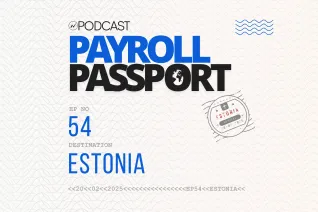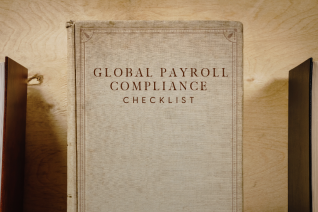Run your business seamlessly with Neeyamo as we help you go beyond borders to manage your international payroll and hire new talent in Estonia
Overview
Estonia, a country so digitally forward that it paved the way for online voting. Estonia stands as a digital pioneer and was the first country to introduce online voting, showing its commitment to a future in the digital age. Similarly, the Estonian labor force is renowned for its loyalty and hard work, reflecting the nation's dedication to progress in the digital era.
Do your organization's expansion plans require hiring employees in Estonia? Do you lack a physical entity in the country – a key requisite to hire local talent? Neeyamo – one of the top Global payroll providers, assists organizations worldwide with onboarding and managing employees in Estonia- processing payroll, accounting and payroll services, managing local compliance requirements, benefits, and more.
LIVE WEBINAR ALERT I Beyond Compliance: Time Tracking’s Role in Shaping Europe’s Future Workforce
Tools And Instances
Facts And Stats
Capital
Tallinn
Currency
Euro (€)
Official Language
Estonian
Fiscal Year
1 January - 31 December
Date Format
DD/MM/YYYY
Country Calling Code
+372
Time Zone
UTC +3 - EEST(Eastern European Summer Time)
Global Payroll
Overview
Payroll: Meaning
Payroll is the list of compensation to be paid to employees of a company or organization for a set period or date. Global payroll provider companies allow organizations to outsource their payroll, allowing employers to focus on other aspects of their business.
What is Global Payroll?
Handling payroll for a widespread workforce can pose a significant challenge for any organization, and the added complication of compliance can make things worse. If companies spend more time processing payroll, it directly impacts day-to-day operations and their overall productivity. The solution to this is global payroll outsourcing using global payroll companies such as Neeyamo.
What is a global payroll system?
Over the years, Neeyamo – Global Payroll Services has observed these complexities and strived to provide global payroll solutions through a single technology platform – Neeyamo Payroll. Neeyamos global payroll systems ease the process for companies looking to outsource their global payroll requirements and aid them in maneuvering the tricky payroll system in Estonia. Neeyamos payroll software provides the perfect solution for all your global payroll needs – for employees working in primary geographies, the long-tail region, remote or internationally located.
How is payroll calculated?
Neeyamo, a payroll service provider, acts as your personalized Payroll Calculator. Ensuring adherence to local regulatory requirements using multi-level controls. Providing timely and accurate payroll, courtesy of our experts worldwide and using a tech-based integrated smart helpdesk solution with seamless support experience manned by payroll experts - Neeyamo has all your payroll needs covered.
Payroll Taxes
Payroll tax is the percentage amount retained from an employee's salary and paid to the government to invest in the general population's welfare. These are statutory in nature and are levied from both the employer and employee. Additional statutory contributions are made by employers towards aiding both short-term and long-term benefits for their employees.
Employee Taxes
Employee Payroll Contributions
- 1.60% - Unemployment Insurance
- 2.00% - Compulsory Pension for those born after December 31, 1982
- 1.60% – 3.60% - Total Employee Cost
Employee Income Tax
- 20% - Flat Rate (Other than on income exempted by law)
Employer Taxes
Employer Payroll Contributions
- 20.00% - Pension
- 13.00% - Health Insurance
- 0.80% - Unemployment Insurance
* There is usually a minimum obligation for the social tax to be paid 215.82 EUR monthly, even if there were no salary payments to employees.
* The employer pays the benefit from day 4 to day 8 of the illness. EHIF pays from day 9; the benefit rate is 70%.
33.80% - Total Employment Cost
Payroll Cycle
Overview
Undoubtedly, payroll is a critical process for any organization. The pay cycle in Estonia refers to the period for which an organization pays its employees, and this can vary depending on the pay frequency that the organization chooses to adopt.
Paycycle
13th Month Cycle
In Estonia, a 13th-month salary is not mandatory. However, bonuses are common and often paid annually. Bonuses may be at the discretion of the employer or provided for in employment contracts or collective bargaining agreements. If the bonus has been agreed between the employer and the employee—for example, in the employment contract—the employee has the right to demand the bonus.
Global Work
Overview
An Employer of Record / EOR services provider helps you eliminate the hassle of handling complexities while onboarding a new employee in an international location. They help bridge the gap that otherwise mandates organizations to have a local registered entity and a local bank account, prior to making a job offer to an international hire.
An Employer of Record provider acts as a legal employer, facilitates salary payments, and manages other statutory requirements such as health insurance, payroll taxes, and employee benefits ensuring compliance with local tax laws and regulations.
This allows organizations to focus on collaborating with the employee in Bangladesh for operational tasks, with the knowledge that they have a cost-effective solution to support their global payroll & HR requirements, as they continue their global expansion.
Neeyamo, a global payroll provider, using its Cloud based HR and Payroll software, strives to provide its customers with a seamless employee management experience and offers global payroll compliance as well as EOR services with our Global Payroll Technology Stack. Neeyamo provides both managed payroll services with an automated payroll system as well as EOR services under one umbrella.
HR Mandates and Practices
Minimum Wage
Effective January 1, 2025, New monthly minimum wage €886
Overtime
The employer and the employee can agree on overtime work, and an employer has the right to demand overtime in certain unforeseen circumstances, in particular for the prevention of damage. Total working time, which includes regular working time plus overtime, generally cannot exceed 48 hours per seven days over a calculation period of four months. However, if necessary, the employer and employee can agree to extend work hours up to 52 hours per week over a calculation period of four months.
Overtime work must be compensated by equivalent time off or by payment at a rate of 1.5 times the employee's regular wage rate.
Minors may not work overtime.
Data Retention Policy
An employee has the right to access any information gathered about him or her by the employer and demand that incorrect information be removed or corrected.
An employer must ensure that the processing of personal employee data is in accordance with the Estonian Personal Data Protection Act.
All employers are required to register their new employees within the employment register.
Hiring and Onboarding Requirements
Hiring
The Estonian constitution protects citizens from discriminatory practices in their day-to-day lives. As an employer, it’s important to comply with the country’s legislation from day one of the recruitment process. The law prohibits discrimination based on the following:
- Sex
- Race
- Nationality
- Color
- Property or social status
- Religion
- Origin
- Language
- Political or other views
*Some of these traits might become apparent as you get to know potential hires throughout the recruitment process, but it’s up to you to make sure they don’t play a role in any staffing decisions. Some characteristics, on the other hand, may require special consideration to stay compliant. For example, you should consider hiring a translator in case any of the candidates you interview are not fluent in your language.*
Onboarding
Mandatory documents for employer records:
- Candidate Name
- Personal ID Code or Registry code
- Residence address
- Date of Birth (if the person has no personal ID code)
- Date of Termination of the contract - Letter of previous employer (if applicable)
- Bank Statements from the past six months
- Income tax return form or certificate of income tax deducted from salary
- Work visa (EU Citizen)
- Residence Permit - D visa (Non-EU Citizens)
- Valid Passport
- Other documents as per the employer’s requirement
Required documents for foreign employees:
Persons who are staying in Estonia on a temporary basis (eg, are working in Estonia but are residing in Latvia) can apply for a personal identification code with the closest local government of the county center upon going there in person;
Upon submission of a notice of residence at the local government unit, persons who do not have the possibility to apply for the personal identification code in Estonia, e.g. are coming to work in Estonia with a visa, can submit the application with the foreign mission of Estonia in a foreign state.
Probation
Probationary (trial) periods are common. They must not last longer than four months (excluding temporary sick leave and vacation days). If a fixed-term employment lasts less than eight months, the period may not exceed more than half of the contract term.
Leave
Public Holiday
There are 12 public holidays in Estonia
- January 1: New Year's Day
- February 24: Independence Day
- April 7: Good Friday
- April 9: Easter Sunday
- May 1: Spring Day
- May 28: Whit Sunday
- June 23: Victory Day
- June 24: Midsummer Day
- August 20: Independence Restoration Day
- December 24: Christmas Eve
- December 25: Christmas Day
- December 26: 2nd Day of Christmas/Boxing Day
Annual Leave
In Estonia, the annual leave entitlement differs depending on the job role and employment contract/collective bargaining agreement in place. According to Section 55 of the Employment Contracts Act, an employee’s annual paid leave is 28 calendar days, unless the employee and the employer have agreed on a longer annual leave or unless otherwise provided by law. For example, government officials are entitled to 35 days of annual leave, and academic and research staff receive 56 days of paid leave.
Sick Days:
Employees in Estonia are entitled to up to 182 calendar days per year. Day 1 to 3 is unpaid leave, day 4 to 8 is paid by the employer, and day 9 to 182 is paid by health insurance at 70% pay.
The current sick leave compensation scheme, where employees receive payment from the second day of sickness, is extended to June 30th, 2023.
The employee's illness must be certified by a physician, and the employee must inform the employer of the necessary absence and of its probable duration.
Maternity Leave:
Pregnant employees are entitled to 140 days of maternity leave in Estonia, which can start at the earliest 70 days before the due date and has a minimum of 30 days.
Maternity leave is compensated at 100% of average earnings calculated based on employment in the previous calendar year with no upper limit on payments. The minimum wage of 654 EUR per month is paid to mothers who had not worked in the last calendar year but then worked before the child’s birth.
The health insurance contributions fund the payment of maternity pay at a rate of 100% of the employee’s average earnings based on the previous year’s earnings. The minimum wage is paid to mothers who had not worked during the previous calendar year but worked before the child’s birth.
Childcare allowance will no longer be granted to children born after 31, August 2019, however; the payment of child allowance and other family allowances will continue.
Paternity Leave:
A paternity benefit is a type of parental benefit. For employed fathers, this includes 30 calendar days of paternity leave from the employer. The aim is to enable fathers to participate more in raising children.
Paternity leave can be taken up to 30 calendar days before the estimated date of birth of the child and until the child turns 3 years old. The paternity benefit is an individual right of the father – paid paternity leave can only be used by the father, and neither can be transferred to the other parent. To receive the paternity benefit, the father’s paternity must be identified, and he must have custody of the child.
Parental Leave:
With effect from 1 April 2022, parents will be able to take up to two months of parental leave at the same time, and they will both receive parental benefits at this time. Parents of premature babies and multiple births will be given an exception and the total duration of the payment of parental benefits will not be reduced by more than 30 days. This will ensure that these families can stay at home with their children in any case until the children reach 18 months of age. A parent can also claim parental benefit until the child is three years old.
Adoptive Parent leave:
An adoptive parent of a child under ten years old is entitled to 70 calendar days of leave starting from the day the adoption court order takes effect. Only one parent can use this leave at a time. Adoptive leave must be taken all at once; it cannot be taken more than 70 days after the court judgment entered into force.
The benefit amount is 100% of the adoptive parent’s average remuneration per calendar day, calculated based on the preceding calendar year, and is paid by the state.
Childcare leave:
A mother or father has the right to childcare leave until his or her child reaches the age of three years. Childcare leave may be used by one person at a time.
Childcare leave may be used in one part or in several parts every year. It is presumed that an employee notifies the employer of taking childcare leave or interrupting childcare leave 14 calendar days in advance, unless the parties have agreed otherwise.
If a parent has been deprived of parental rights or if his or her child lives in a social welfare institution, the parent does not have the right to childcare leave.
An employee has the right to compensation for the period of childcare leave in accordance with the Parental Benefits Act, and to a childcare allowance in accordance with the State Family Benefits Act.
Child Leave:
Each calendar year, a mother or father has the right to receive child leave which shall be remunerated on the basis of the minimum wage established by the Government of the Republic:
- for three working days if she or he has one or two children under 14 years of age;
- for six working days if she or he has at least three children under 14 years of age or at least one child under three years of age.
- a mother or father of a disabled child has the right to child leave of one working day per month until the child reaches the age of 18 years, which is remunerated on the basis of the average wages.
- In the year the child turns three, fourteen, and eighteen years of age, child leave is granted regardless of whether the birth date of the child falls before or after the leave.
- If a parent has been deprived of parental rights or if his or her child lives in a social welfare institution, the parent does not have the right to child leave.
- A claim for child leave expires after the end of the calendar year in which the claim became collectible.
Child Leave Without Pay:
A mother and father who is raising a child of up to 14 years of age or a disabled child of up to 18 years of age have the right to child leave without pay of up to ten working days every calendar year. A claim for child leave without pay expires after the end of the calendar year in which the claim became collectible.
Right of guardian and caregiver to child care leave, child leave and child leave without pay.
A guardian and a person with whom a foster care agreement has been entered into has the right to child care leave, child leave, and child leave without pay.
Study Leave:
An employee has the right to study leave under the conditions and pursuant to the procedure prescribed in the Adult Education Act.
An employee has the right to holiday without pay in order to take entrance examinations.
Termination
Termination Process
Termination by Employer:
The employment contract can be terminated upon agreement between the parties at any time, and either party can terminate the contract with 15 days' notice during a probationary period of four months from the date of commencement of employment. The probationary period does not have to be specified in the employment contract unless the employer and the employee agree to a period shorter than four months.
An employer can terminate an employment contract for cause if the employee:
- Is unable to perform his or her duties for a period of at least four months due to ill health;
- Is unable to perform his or her duties due to lack of skills, unsuitability for the position, or inability to adapt to changed working conditions;
- In spite of a warning, disregards the employer's reasonable instructions or breaches his or her duties;
- In spite of the employer's warning, comes to work in a state of intoxication;
- Commits theft, fraud, or another act resulting in loss of the employer's trust;
- Damages the employer's reputation;
- Causes or threatens significant damage to the employer's property; or
- Violates the employer's confidence.
The employer must give employees advance notice of termination of employment for breach of contract or inability to perform required duties as follows:
- 15 calendar days, if employed less than one year;
- 30 calendar days, if employed one to five years;
- 60 calendar days, if employed five to 10 years and
- 90 calendar days, if employed 10 or more years.
The employer also may pay compensation in lieu of notice.
Termination by Employee:
An employee has the right to cancel an employment contract for an indefinite term at any time with 30 days' notice. Employment contracts entered into for specified terms can only be terminated for cause.
An employee has cause to terminate an employment contract without notice if the employer commits a severe breach of the contract, in particular if:
- The employer has degraded the employee or allowed others to,
- The employer has considerably delayed payment of wages or
- Continuation of work would pose a real threat to the employee's life, health, morals or good name.
An employee also has cause to terminate employment if the employee's health or family obligations prevent the performance of agreed-to work and the employer does not provide suitable alternative work.
Plant Closing and Mass Layoffs:
Mass layoffs can be justified if there is a significant decline in production, a significant reorganization or a termination of the business. Under the Employment Contracts Act, a mass layoff is defined as the laying off within 30 calendar days of no less than:
- Five employees in an enterprise where the average number of employees is up to 19;
- 10 employees in an enterprise where the average number of employees is 20–99;
- 10 percent of the employees in an enterprise where the average number of employees is 100 to 299 or
- 30 employees in an enterprise where the average number of employees is at least 300.
Before the employer decides on a layoff, it must consult with its employees with the goal of reaching an agreement on the prevention or reduction of the planned layoffs or a mitigation of their consequences, including retraining or assistance in finding a new job.
Notice Period
In Estonia, the notice period is stipulated by the service that the employee has worked at a single organization as follows:
- 15 calendar days, if employed less than one year;
- 30 calendar days, if employed one to five years;
- 60 calendar days, if employed five to 10 years and
- 90 calendar days, if employed 10 or more years.
It is also possible to give pay in lieu of notice.
If an employer terminates employment during the probation period, the employer must give 15 days’ written notice.
In case the employee resigns he must give 30 days’ notice.
Severance Pay
In cases of termination of the employment contract due to redundancy, the employer must pay compensation of one month’s salary payment (calculated on the employee’s average wage across the previous six months).
Employees with employment service of between 5 to 10 years are entitled to an additional one month’s salary from the unemployment insurance fund (Töötukassa); if the employees’ service is ten years or more, the employee is entitled to an additional one month’s salary from the unemployment insurance fund.
Visa
Overview
Foreign nationals may apply for residence/employment permits with an employer registered in Estonia that has government permission to hire a foreign national and if the salary paid to the employee meets a prescribed minimum.
European Union and European Economic Area nationals have the right to stay in Estonia on the basis of a valid travel or identity document and do not need a visa or a residence permit to work there, although they must register their residence within three months of entry.
Other foreign nationals may work in Estonia temporarily for up to 270 days a year if their employment has been registered prior to commencement.
Post-Entry Requirements:
If employment exceeds six months in a year, a foreign national must apply for a residence permit. Separate work permits are not required. Foreign nationals granted a temporary residence permit may work for several employers at the same time.
Digital Nomad Visa. In August 2020, Estonia introduced a digital nomad visa, which allows eligible applicants on a temporary basis to live and work remotely in Estonia for up to one year. It is meant for people who can perform their work location independently using telecommunications technologies and who work for an employer registered outside of Estonia or as a freelancer for clients mostly abroad. The visa does not give the right to obtain Estonian citizenship or permanent residency. Applicants must meet a minimum monthly income threshold.
Penalties:
Illegally employing a foreign national in Estonia is punishable by a fine of up to 3,200 euros.
Employee Background Checks
Legal and Background Checks
Pre-employment references and background checks
Employers may request a reference from a previous employer with the consent of the candidate. However, the use of pre-employment references is not common. Other background checks, such as medical history checks and criminal record checks, can only be requested if they are relevant to the job. However, employers often make use of public databases to investigate the background of candidates.
Last updated on December 26, 2024
If you have any queries or suggestions, reach out to us at irene.jones@neeyamo.com
Have Queries? Get In Touch With Us
Get in touch with one of our experts and take a quick demo of our services










